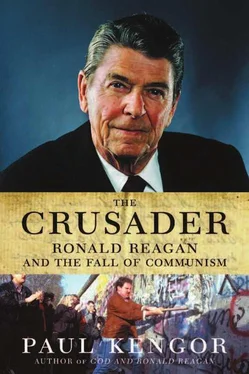13. Later, from the apex of the Soviet leadership, Mikhail Gorbachev himself spoke to the morale issue and even Reaganomics. “It was widely accepted that the first four years of ‘Reaganomics’ had stabilized the US economy,” acknowledged Gorbachev, “and that the Reagan administration had contributed to the strengthening of the ‘American spirit.’” Gorbachev, Memoirs, 415.
14. Vladimir Simonov, “Political Portrait of Ronald Reagan,” Literaturnaya Gazeta , May 25, 1988, 14, published as “Weekly Presents ‘Political Portrait’ of Reagan,” in FBIS-SOV88–102, May 26, 1988, 8, 10.
15. Michael Ellman and Vladimir Kontorovich, eds., The Disintegration of the Soviet Economic System (London and New York: Routledge, 1992), 18.
16. Schweizer, Victory, 166.
17. TASS release written by economic writer Vladimir Pirogov, December 29, 1983, published as “U.S. Seeks to ‘Exhaust’ USSR Economy,” in FBIS, FBIS-SOV-29-DEC-83, December 29, 1983, A4.
18. These sources include Peter Schweizer, who wrote of the campaign in Victory and Reagan’s War, as well as references made by Vasiliy Mitrokhin in his research and Anatoly Dobrynin in his memoirs. The term “active measures campaign” was a KGB intel term that referred to spreading propaganda, disinformation, and conducting operations against an individual, short of assassination.
19. On the campaign and this quote, see Schweizer, Victory, 171–73, 201. 20. Vitaliy Korionov, “Production Line of Crimes and Hypocrisy,” Pravda , January 10, 1984, 4, published as “‘Unprecedented Wave’ of Lies Seen in U.S.,” in FBIS-13-JAN-84, January 13, 1984, A1, A5.
21. Vladimir Lomeyko, “NATO’s Procrustean Bed,” Literaturnaya Gazeta , January 25, 1984, 14, published as “‘Psychological War’ Eyed as Cold War ‘Crusade,’” in FBIS-3-FEB-84, February 3, 1984, CC5.
22. A. Gurov and V. Martynenko, “Imperialism’s Economic Aggression,” Krasnaya Zvezda , January 27, 1984, 3. Text is published as “U.S. Anti-Socialism Includes ‘Economic Warfare,’” in FBIS, FBIS-SOV-2-FEB-84, February 2, 1984, CC1–4.
23. Specifically, they stated: “But what failed earlier, when the Soviet state did not possess such powerful scientific, technical, and production potential as it does now, is all the more doomed to failure under modern conditions….The socialist countries counter imperialism’s economic aggression with the further deepening of fraternal cooperation, economic integration, and unbreakable cohesion….A resolution rebuff will continue to be dealt to the subversive actions of the ‘economic NATO.’”
24. See Caldicott speaking on “Reagan,” The American Experience, PBS.
25. To the best of my knowledge, this book is the first full examination and presentation of the Chebrikov document. The document came from the Central Committee Archives of the Communist Party of the former USSR. There are a number of different archives from the Soviet period, including, for example, the KGB Archives, the Comintern Archives, among others. The archives were opened in the early 1990s by the Boris Yeltsin government, whereupon scholars and journalists eagerly began digging into the documents. The Yeltsin government, for various reasons, closed many of the archives, including the Central Committee Archives, in the 1994–95 period.
The document that I cite here was apparently initially found by a London Times reporter in early 1992. The London Sunday Times subsequently published an article on the document, titled “Teddy, the KGB and the top secret file,” in the February 2, 1992 edition. The Times article, however, was brief and included only a few quotes from the document; the newspaper published only a photo of a small section from the upper left corner of page one of the fivepage document. Once the Times piece ran, a number of people scrambled to the archives to obtain their own copy of the document, which then began circulating in and around Moscow. Various individuals obtained copies. Shortly thereafter, the Russian government closed the file. Among those who obtained a full copy was Herb Romerstein, author of the seminal work on the Venona papers, The Venona Secrets. Romerstein is a former staff member of the U.S. House Permanent Select Committee on Intelligence and a seasoned veteran of archival research from the Cold War period. Romerstein continues to do research from intelligence archives of former Communist countries. My copy was obtained through Marko Suprun, who got the copy from Herb Romerstein and Walter Zaryckyj. Romerstein provided details to me on the document’s origin in a number of discussions in June 2005.
26. Tunney won his seat by defeating close Reagan friend George Murphy in the 1970 race. He lost his reelection bid in 1976 to Republican Samuel Hayakawa.
27. They were classmates at the University of Virginia Law School. See the November 16, 1970 profile of Tunney in Time magazine, and Charles T. Powers, “Can John Tunney Make It as a Heavyweight?” West Magazine (Los Angeles Times), December 12, 1971. Both articles are posted on Tunney’s Web site.
28. Ibid. Tunney quote is taken from West Magazine piece.
29. Ibid.
30. When told about the Tunney-Kennedy effort two decades later, Bill Clark said that he and others in the Reagan administration had heard that certain leftist politicians were reaching out to Moscow, though Clark could not recall specific names, including Tunney and Kennedy, and never pursued the information. Interview with Clark, July 7, 2005.
31. Tunney was tracked down by the London Times, which obtained a copy of the memo in 1992. The Times’ translation makes Kennedy look even worse on the matter of personal political motivations; it says that Tunney informed the Soviets that Kennedy was “directing his efforts at becoming president of the US in 1988.” When asked about this specifically, Tunney dismissed Chebrikov’s interpretation as “bullshit.” See “Teddy, the KGB and the top secret file,” London Sunday Times, February 2, 1992.
32. I suspect that some will also claim that Kennedy’s overture was not completely unusual, since a number of liberal Democrats at the time (including the other Massachusetts senator, John F. Kerry) had gone so far as to openly meet with Communist enemies like Nicaragua’s Daniel Ortega. The difference, however, is that Kennedy’s overture was to Moscow, to Yuri Andropov himself. That was quite unprecedented.
33. Vasiliy Mitrokhin, “The KGB in Afghanistan,” Working Paper No. 40, English edition, Christian F. Ostermann and Odd Arne Westad, eds., Cold War International History Project, Woodrow Wilson International Center for Scholars, Washington, DC, February 2002. A full copy of the working paper, in PDF format, is available at the Web site of the Wilson Center. See Herbert Romerstein, “Ted Kennedy, ‘Collaborationist,’” Human Events, December 8, 2003.
34. Edward M. Kennedy, “A State of Disunion,” Rolling Stone magazine, March 15, 1984, 11–12. It is not clear whether Kennedy meant a “wider war” in Central America, which he mentioned in the previous sentence, or a “winnable nuclear conflict” generally, which he referred to in the next sentence.
35. Tim Weiner, “Lies and Rigged ‘Star Wars’ Test Fooled the Kremlin, and Congress,” New York Times, August 18, 1993, A1.
36. Interview with Peter Schweizer, September 19, 2005. In an e-mail exchange, Schweizer gave me the go-ahead to use this material and cite him as the source. Importantly, the Times article noted that the rigged test was intended to fool the Kremlin, and that it also (intentionally or not) fooled Congress. From what I could learn of the incident, the goal was not to mislead Congress. The goal was to mislead the Soviets.
37. The reporter added: “The total collapse of the European postwar order is being sought. To state it even more clearly: Socialism’s right to exist as a world system is disrupted. He [Reagan] will ‘not accept’ Yalta, he will ‘not accept’ socialism.” Hartmut Kohlmetz, “Attacks Against Yalta,” East Berlin Berliner Zeitung, August 21, 1984, published as “Reagan View of Yalta Could Disrupt Postwar Order,” FBIS, Eastern Europe, E1.
Читать дальше












